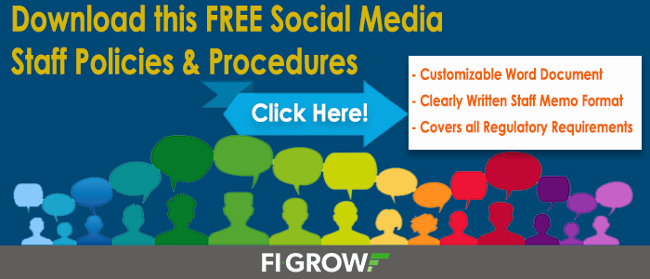Is Your Bank Credit Union Social Media Policy Fool Proof? [Quiz]

![Is Your Bank Credit Union Social Media Policy Fool Proof? [Quiz]](https://www.figrow.com/hs-fs/hubfs/quiz_image.png?width=950&name=quiz_image.png)
Don't Miss An Episode, Subscribe Now
Don't Miss Anything Major in Your Bank or Credit Union Social Media Policy - Take This Short Quiz Now!
You probably already know that your Financial Institution's Social Media Policy needs to be good, even great - but the reality is that in today's social media obsessed world, your social media policy needs to be positively foolproof.
To determine whether your institution is really ready to deal with clients (and with the world) via social media, take the following quiz.
#1: Are Employee Roles Clearly Defined For All Social Media Usage?Your social media policy should clearly define which employees will handle the credit union's social media accounts. The people who are authorized to post on behalf of your credit union should be explicitly allowed to do so according to the terms of their contract.
In the absence of a contract, be sure that authorized employees receive and sign an agreement that outlines their responsibilities when it comes to posting on behalf of the credit union. Perhaps most importantly, make sure that your social media policy has explicit wording prohibiting other employees from posting on behalf of the credit union unless they are specifically authorized to do so.
#2: Does Your Policy Cover the Use of Social Media While at Work?
Your bank or credit union employee policy should be very clear regarding social media usage during work hours. Although some employees may not have computer access while they work, the majority of employees will have access to their smartphones or other mobile devices. Your FI should make sure that a blanket policy is in place, one that will cover all social media use whether it's on computer or personal mobile devices.
You may want the policy to state that employees are not allowed to access or utilize social media sites during work hours without explicit supervisor permission, unless they are on a break or meal break. However, some FIs are a bit more flexible with this part of the policy. This is obviously up to your senior management to decide.
DOWNLOAD NOW: Our Free Social Media Staff Policy Now!
#3: Does Your Policy Cover the Use of Social Media While NOT at Work?
Although your employees are certainly entitled to use social media freely in their time away from work, it is important that you remind them that their behavior online could reflect on your institution. Make sure that the final policy specifically mentions that employees should keep the nature of the Internet in mind as they use social media any time.
This means that posts they make on personal social media accounts could become public, even if they don't intend for that to occur. Because of this reality, employees should use good judgment if they mention or otherwise discuss the bank or credit union on social media.
The policy should also remind employees of confidentiality agreements regarding their job and areas of responsibility.

#4: Does Your Policy Have a Content Removal Plan For Damaging Posts?
Nearly every bank or credit union - in fact, every business of any type - will occasionally have to deal with damaging social media posts. These posts, although rare, have the potential to be a problem for a variety of reasons, so it is important to have as many of those reasons as possible covered within your policy.
You should also be prepared to properly respond to these kinds of negative posts.
Your policy should generally state that the financial institution reserves the right to remove social media posts that don't meet the established content guidelines. Generally, this means excluding:
- Posts made by false profiles or people posting under an alias
- Libelous posts
- Harassing posts
- Threatening posts
- Sexual or otherwise explicit posts
- Spam posts (this will include any solicitation)
- Posts that encourage or discuss illegal activity
- Posts that contain personal attacks
- Posts that are designed to cause social media account disruption
#5: Does Your Policy Have a Social Media Mission Statement?
While a social media mission statement need not be nearly as explicit or lengthy as a standard mission statement, it is still wise to explain the purpose of your social media presence.
For example, your policy may mention that the bank or credit union wants to share information about current products, make it easier for clients to reach out to them, and keep clients updated on changes in real time. It may also be wise to state that the purpose of your online presence is not to discuss specific account information in a public forum, because it would violate client privacy.
Can you answer "Yes!" to all five of the questions above?
If so, your bank or credit union is ready to use social media to your advantage. If you answered "No" to any of the five, consider downloading our FREE Social Media Policy & Procedures and then you'll be good to go!
Remember, the goal is to control the direction of the social media accounts rather than allowing social media to direct you!





Blog comments